Rising Culinary Star Joins L’Auberge Provençale
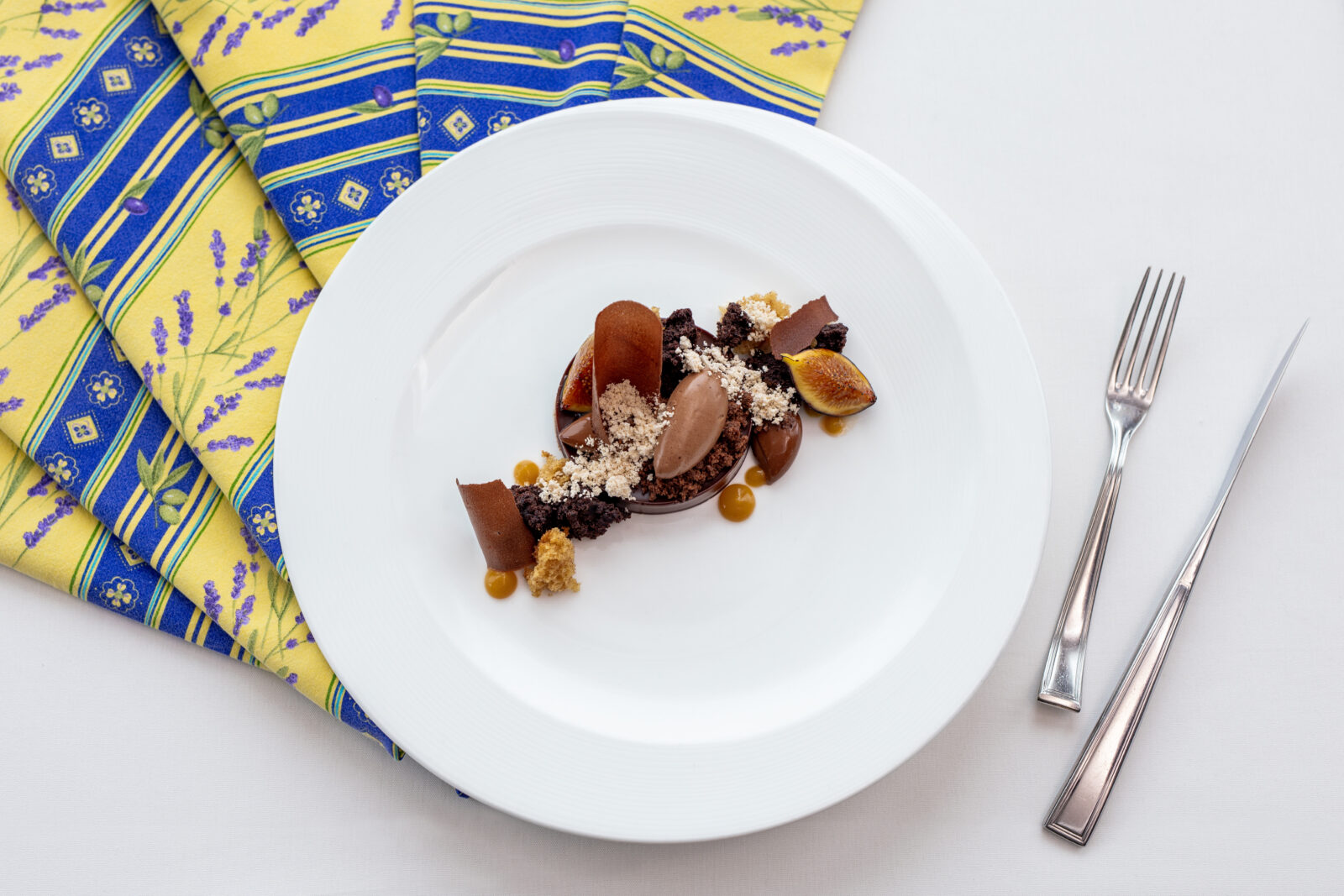
Written by Bill Kent
Photos Courtesy of L’Auberge Provençale
“This is as good as it gets,” Chef Stephen Burke says as he takes off for the fruit orchard a few steps from L’Auberge Provençale’s kitchen. “I am literally that kid in a candy shop.”
At 25, Burke is the youngest executive chef in the venerable Inn’s 40-year history, and he has big plans for himself and for the region’s legendary farm-to-table restaurant.
“I’m cooking bright, light, and even more flavorful,” he says as he rushes about the orchard, examining the ripening fruit for possible inclusion in the evening’s tasting menu. “Farm-to-table is in my blood. I grew up in Broad Run surrounded by farms. As early as I can remember, I wanted to hop the fence, go into the fields, and get into all kinds of trouble.”
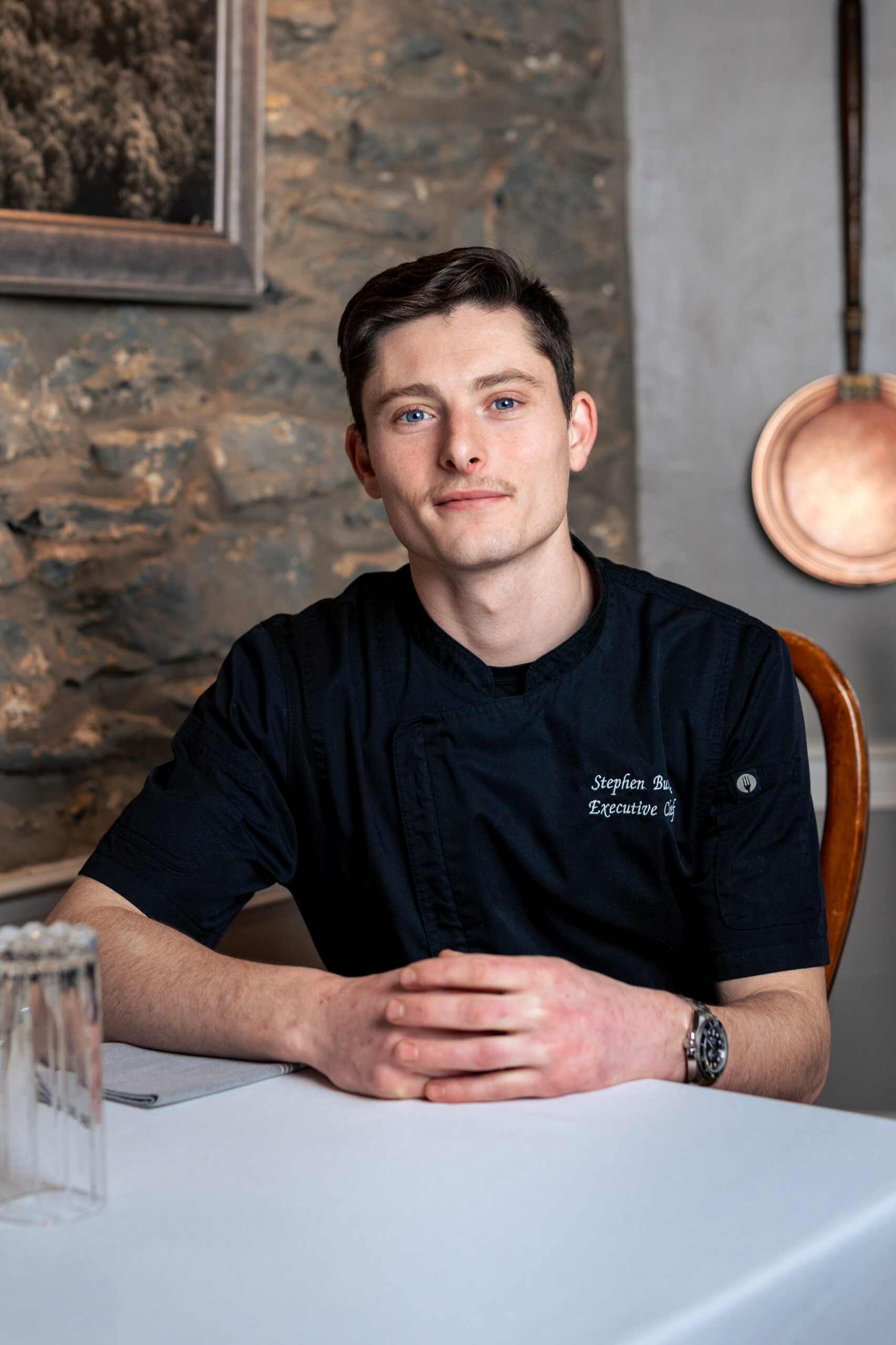
His most vivid childhood memories are of helping cook the evening meal with his family. “We got just about everything we needed from the farms around us. I learned to taste as we cooked and to really appreciate the changes that happen from the preparation all the way up to the serving of the dish. I couldn’t believe how good it all was. I mean, I was thrilled.”
Burke has a special appreciation for vegetables. “I know proteins. I like proteins. Guests have a pretty good idea of what proteins should taste like so the best thing most of the time is to keep things simple. But what really impresses me, what really challenges me, what I really love more than anything else, is what I can do with vegetables.”
You heard right: Chef Burke was the kid who ate his vegetables — without prompting. “When they’ve been grown [as] beautifully as we grow them at the Inn, with care, attention, and a little bit of pride; when you can get them fresh off the tree, off the vine, right out of the ground; and when you can take the time to bring all the flavors forward — it’s the best.”
Chef Burke’s love of purposely grown ingredients has inspired him to be creative, even from an early age. “One side of my family is British so a special meal for us was lamb vindaloo or chicken tikka masala. When I cook for myself or for friends, I use Thai and Korean flavors — not so much hot, but warm, so it rounds out what you’re tasting and adds just enough heat to make you happy as it goes down.”
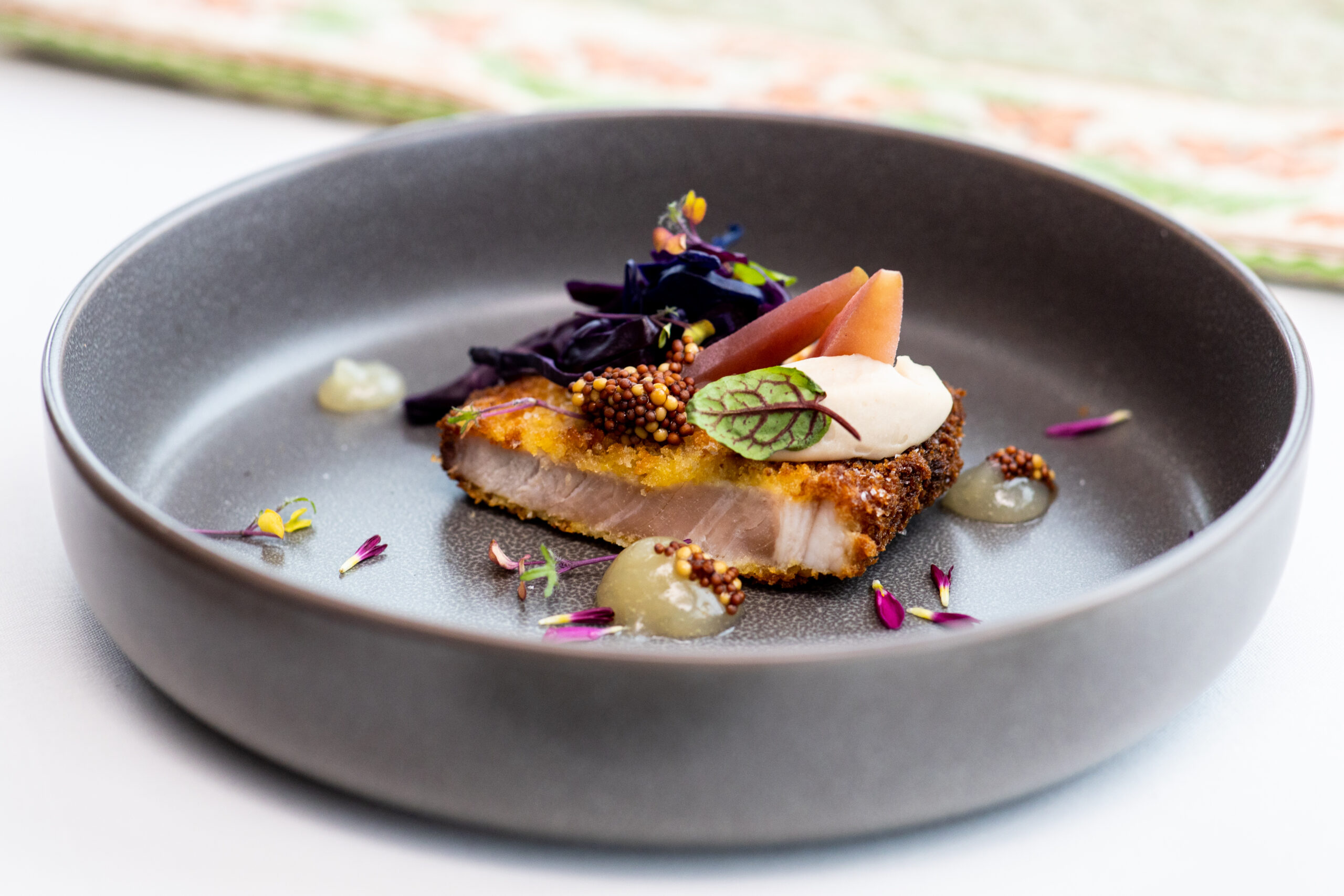
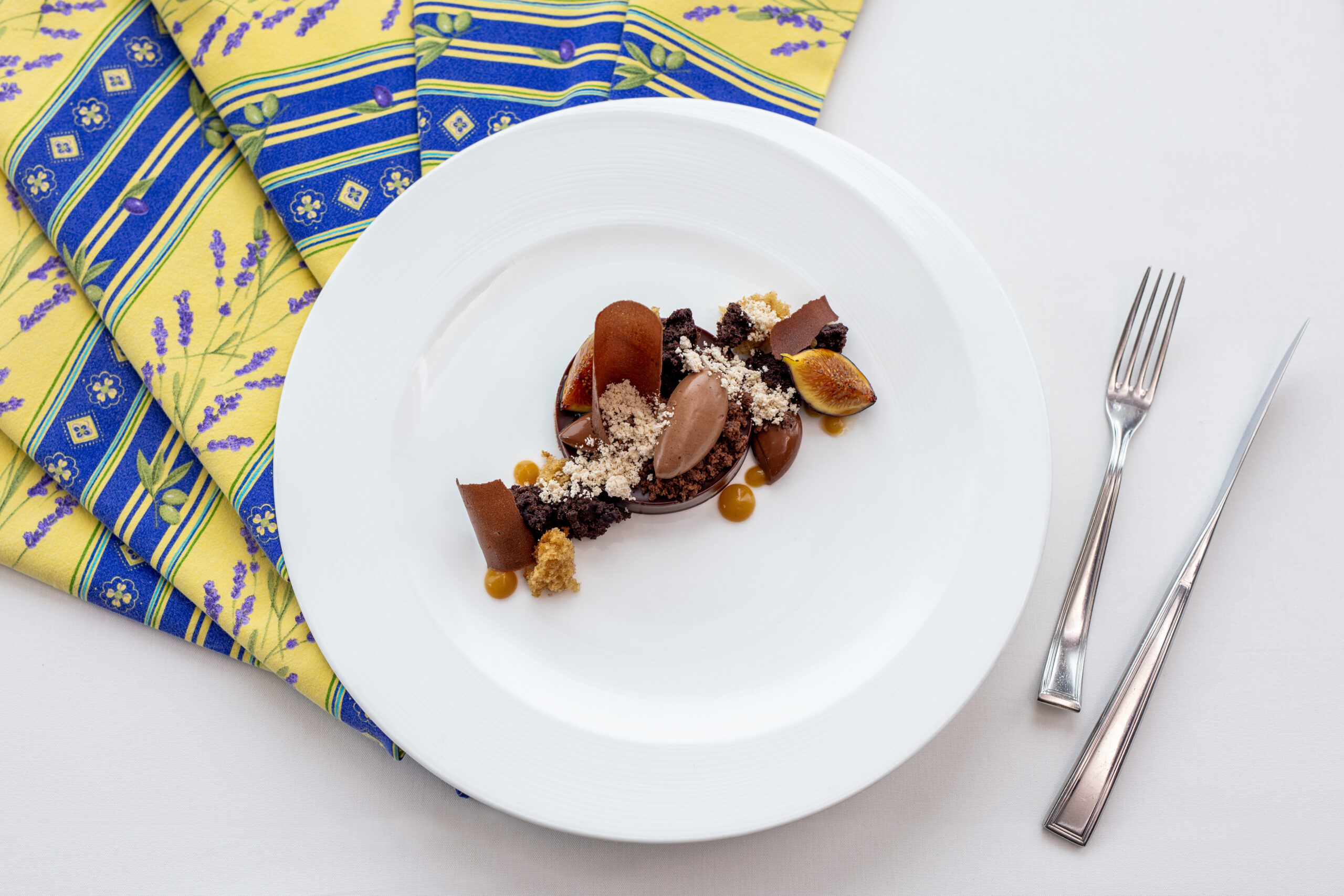
Left: Pork schnitzel with pickled apple and cabbage, calvados jam, and pickled mustard seeds. Right: Layered mousse cake with plum glee, fig, and TCHO gelato.
As a child, when Burke’s family went out to eat, he begged to be taken into the restaurants’ kitchens. “Going into a kitchen charged me up. As soon as I was old enough to show I knew how to chop an onion, I began to get jobs in kitchens. I staged and worked fill-in jobs anywhere I could.”
Even so, it never occurred to him to take a formal cooking course. “I thought I should get a degree in biology from the community college, but I kept getting calls to fill in, so after three years of missing classes and learning cuisine in some of the best restaurants in Napa, I had to say goodbye to [the degree].”
He had good reason. At the age of 21, after filling in for every position at Litchfield’s, a wine country destination restaurant in the whistlestop town of Bodega, California, his tenure as temporary executive chef became permanent. “It was California cuisine, but with a lot of Spanish and Portuguese influences. I just had a blast there.”
At Litchfield’s, Burke also met the woman who is now his wife. “Kelly was a server and, no, it wasn’t one of those front-of-the-house/back-of-the-house romances. Things couldn’t be better,” he says.
Kelly came with him when he returned to Virginia to work as a sous chef at Three Blacksmiths and The Inn at Little Washington, finally arriving at L’Auberge Provençale a few months before people began to talk about a “pandemic.”
American-born Celeste Borel created L’Auberge Provençale with her husband, Chef Alain Borel, in an 18th-century farmhouse surveyed by George Washington. She says the COVID-19 lockdown came with unexpected silver linings for the business. “We had an uptick in our in-room dining. We had to close briefly but when we were told we could do outdoor dining, we moved the tables outside. So many people were just tired of being inside that we became very busy. You wouldn’t believe it but 2021 was our best spring ever.”
On January 1, 2022, Burke stepped up to become executive chef. “It was like that moment when you take your place at the family table. Not the head of the table — that will always belong to Chef Alain. But, with Celeste managing the Inn, and [the Borel’s] son Christian as the sommelier, I felt like I was home again.”
Burke says that the Inn’s dozen or so local farmers never fail to inspire him. “We get our truffles from Virginia Truffle in Rixeyville when they’re in season — I put them on our flatbread with fruit from the orchard as a really, really intense variation on the Hawaiian pizza. We must have steak frites on the menu — we’re a French country inn and our guests expect it. But we get this delicious Wagyu beef from Ovoka Farm right down the road in Paris, Virginia, that is so good it’s enough to make me stop eating vegetables — for a little while.”
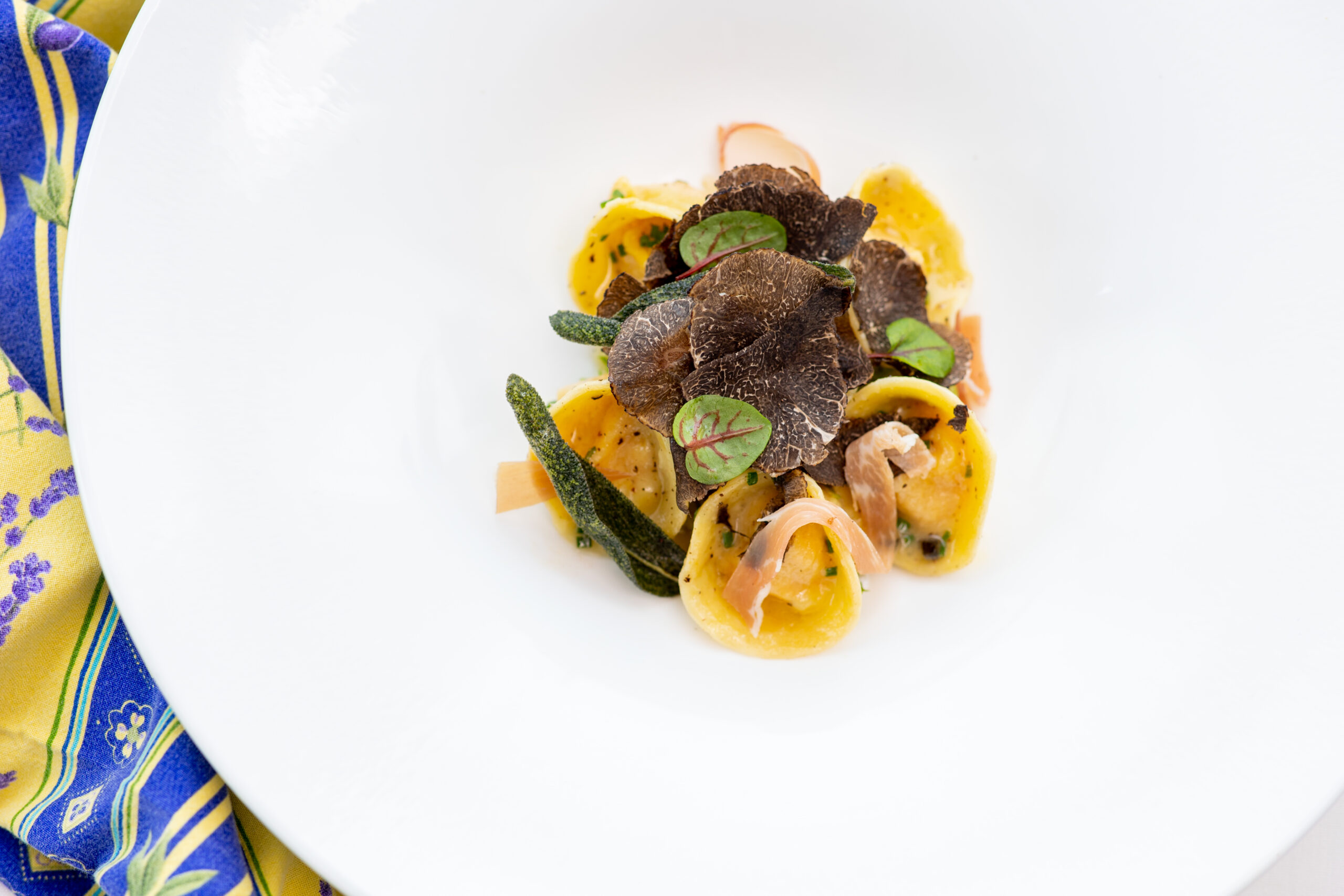
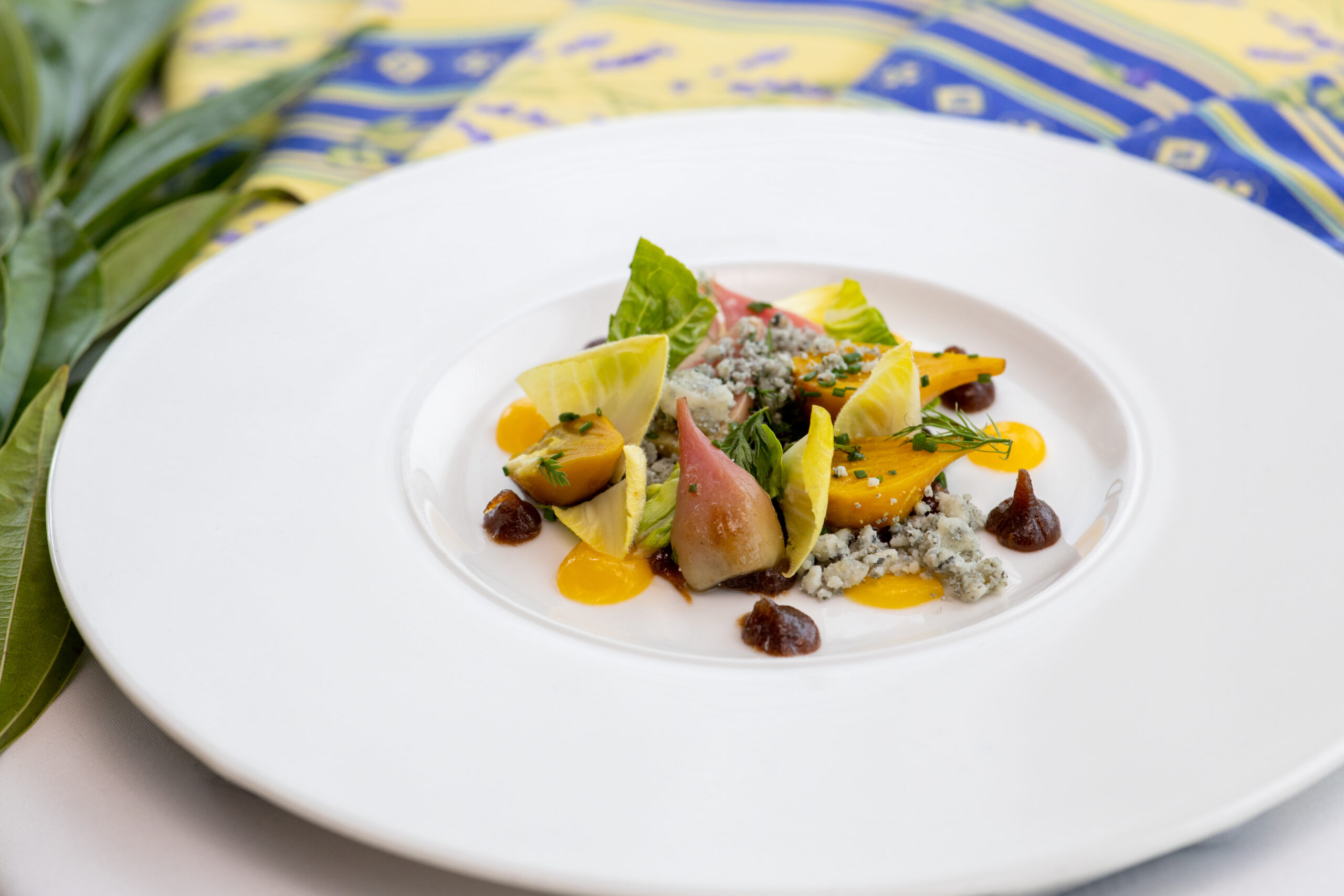
Left: Butternut tortellini-jambon Serrano with fried sage, Virginia truffle, and balsamico. Right: Slow-roasted beets with greens, bleu cheese, hazelnut, dates, sherry, and feuille de brick.
Nearly all the vegetables on the menu are grown in the Inn’s garden. Though Chef Burke is not a vegetarian, he wants the Inn’s menu to be even more welcoming for guests with special diets, allergies, or preferences. “I have two tasting menus and one is vegetarian and gluten free. I have fun with both,” Burke emphasizes.
One of his most creative gluten free/vegetarian offerings is his tomato and wild berry tartar. “People are used to tartars of beef or other proteins. We make one that has that wonderful red color with tomatoes and berries and put [it] in [a] puffed pastry shell with a buttermilk sorbet. If you can’t have dairy, we can work around that.”
Another specialty is Burke’s citrus-cured Hamachi. “Hamachi is yellowtail used in sushi. [It has] a hint of the flavor of ceviche. [The dish] comes with a cucumber-jalapeno coulis and melon. The flavors don’t sound like they would go together but they absolutely do.”
A dish in development for the fall will be a cassoulet, similar to what Burke had when he visited the French castle town of Carcassonne. “I want to make two versions: one with lamb or something really rich and comforting, and a vegetarian version that delivers the same feeling but tastes just a little bit different.”
With Kelly serving in the dining room and Chef Burke’s younger brother Andrew as chef de partie and garde manger, Chef Burke wants to put down roots and start a family. He’s currently looking for a house to buy. Days off are spent hiking with Kelly in and around the Shenandoah Valley.
In five to ten years he sees himself opening his own restaurant, and, if all goes well, shooting for a Michelin star.
“But I don’t think about the future that much because I am doing what I’ve always wanted to do with the best people helping out and loving it as much as I do, in one of the most beautiful places in the world. It doesn’t get any better,” Burke says. ML
L’Auberge Provençale is located at 13630 Lord Fairfax Hwy, White Post, Virginia, 22620. For more information call (540) 837-1375 or visit laubergeprovencale.com.
This article first appeared in the August 2022 Issue.








